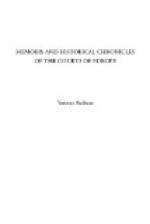ON MARGUERITE DE VALOIS.
QUEEN OF NAVARRE.
Dear native land! and you, proud castles! say
(Where grandsire,[1] father,[2] and three brothers[3] lay,
Who each, in turn, the crown imperial wore),
Me will you own, your daughter whom you bore?
Me, once your greatest boast and chiefest pride,
By Bourbon and Lorraine,[4] when sought a bride;
Now widowed wife,[5] a queen without a throne,
Midst rocks and mountains[6] wander I alone.
Nor yet hath Fortune vented all her spite,
But sets one up,[7] who now enjoys my right,
Points to the boy,[8] who henceforth claims the throne
And crown, a son of mine should call his own.
But ah, alas! for me ’tis now too late[9]
To strive ’gainst Fortune and contend with Fate;
Of those I slighted, can I beg relief?[10]
No; let me die the victim of my grief.
And can I then be justly said to live?
Dead in estate, do I then yet survive?
Last of the name, I carry to the grave
All the remains the House of Valois have.
[Footnote 1: Francois I.]
[Footnote 2: Henri II.]
[Footnote 3: Francois II., Charles IX., and Henri III.]
[Footnote 4: Henri, King of Navarre, and Henri, Duc de Guise.]
[Footnote 5: Alluding to her divorce from Henri IV.]
[Footnote 6: The castle of Usson.]
[Footnote 7: Marie de’ Medici, whom Henri married after his divorce from Marguerite.]
[Footnote 8: Louis XIII., the son of Henri and his queen, Marie de’ Medici.]
[Footnote 9: Alluding to the differences betwixt Marguerite and Henri, her husband.]
[Footnote 10: This is said with allusion to the supposition that she was rather inclined to favour the suit of the Duc de Guise and reject Henri for a husband.]




